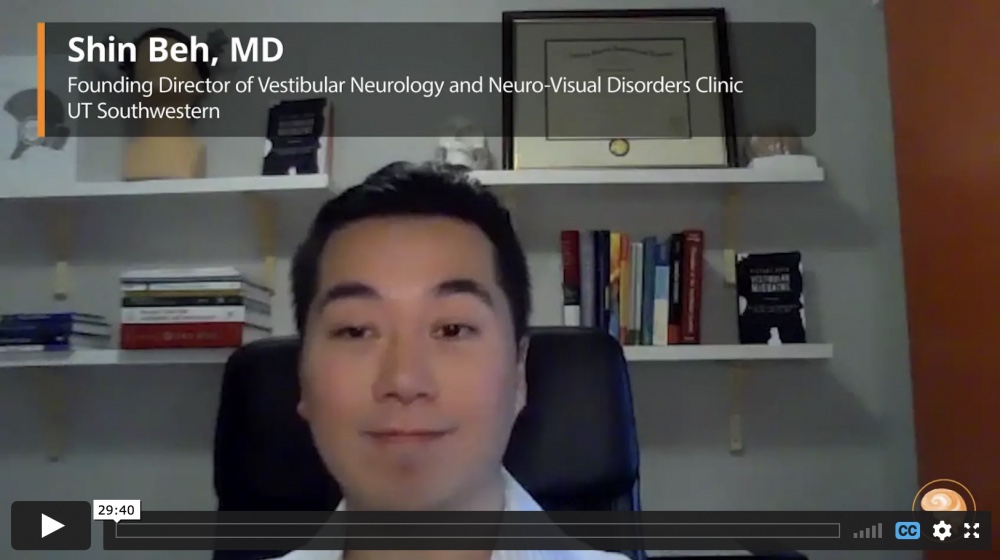
Severe headache is the symptom many think of first with migraine, but for some, there may be other symptoms, like vertigo, that are the most disabling and prominent. While vestibular migraine can have a devastating impact on quality of life, it’s often challenging for people to receive a correct diagnosis or effective treatment. How do we know the difference between vestibular migraine and other forms of migraine with vertigo or dizziness, as well as the other conditions that share this prominent symptom? Dr. Shin Beh is an assistant professor of Neurology at the UT Southwestern Medical Center and the founding director of its Vestibular Neurology and Visual Disorders Clinic. He is a member of the American Academy of Neurology, the North American Neuro-Ophthalmology Society, and the American Headache Society.
What is vestibular migraine?
Dr. Beh: Many symptoms are similar to those of people with migraine: vertigo, light, sound and smell sensitivity. However, there may be no headache phase at all, just the full-blown vertigo symptoms. Many can also have a lot of constant lightheadedness and dizziness—a disequilibrium that’s present all the time and that’s aggravated by busy visual scenes or moving too quickly. Patients often tell me that this type of dizziness is, in fact, even more disabling. As an example, going to the grocery store can be unpleasant because of the overwhelming visual scenes, fluorescent lights, shiny floors and crowds, even if you’re not having an attack, and work on a computer can be difficult or impossible. Other disabling symptoms might occur during menstruation or when eating certain foods, and many get vestibular issues accompanied by cognitive difficulties, often referred to as brain fog. Vestibular migraine is more common as people age, and especially for women, after menopause.
What other conditions share these vestibular symptoms, making it difficult to diagnose?
Dr. Beh: Three conditions that can have some of the same symptoms are Meniere’s disease, benign paroxysmal positional vertigo (BPPV) and persistent-postural perceptual dizziness (PPPD). Meniere’s disease is a condition of the inner ear causing attacks of ear pressure and roaring tinnitus, followed by vertigo. Meniere’s disease patients tend to have hearing loss, usually asynchronous, while those with vestibular migraine don’t. Half of Meniere’s patients also have migraine, though we don’t know why. In BPPV, a loose crystal breaks off from one part of the ear and then wanders into a different part of the ear. Vertigo attacks are very short, generally measured in seconds (unlike vestibular migraine), and can usually be mitigated simply by changing the head angle. PPPD is a condition with constant, ongoing persistent dizziness, unsteadiness, and disequilibrium that can be triggered by any condition that causes vertigo, such as vestibular migraine. The two conditions can coexist, but PPPD can also be caused by conditions other than vestibular migraine.
How important is it to get a diagnosis?
Dr. Beh: In general, an accurate diagnosis can take away a lot of uncertainty. Even if the person doesn’t meet the full criteria of vestibular migraine, if a clinician is fairly certain that the symptoms are coming from migraine, appropriate treatment can be started. And like the progression of chronic migraine from untreated episodic migraine, a person with vestibular migraine who has many attacks of vertigo can develop worsening symptoms. The brain doesn’t recover immediately after a vertigo attack; you may be disoriented and dizzy, and then even before you can become normal again, you get another attack of vertigo. It becomes a downward spiral of dizziness and vertigo that just gets worse and worse. As with chronic migraine, there is an inability to fully recover from one attack before starting another. Finding the right treatments can make a real difference.
Watch the full interview for answers to:

What is vestibular migraine?
To what extent can the symptoms of vestibular migraine cause disability?Are vestibular symptoms more likely to happen at a certain stage of an attack?
What is the difference between vestibular migraine, and migraine with dizziness or vertigo as part of the attack?
Are there any triggers specific to vestibular migraine attacks?
What is the difference between vestibular migraine and other conditions that cause vestibular symptoms, like Meniere’s disease, BBPV, or PPPD?
What is the relationship of tinnitus to vestibular migraine?
Why is the diagnosis of vestibular migraine so complicated, and does having an accurate diagnosis matter?
Can vestibular migraine symptoms get worse over time if untreated?
How can people who suspect they have vestibular migraine find help?
How can vestibular migraine be treated, either therapeutically or with alternative approaches?What does the future hold for those living with vestibular migraine?
Watch Dr. Beh’s interview here, or order it as part of the Migraine World Summit package from this page.